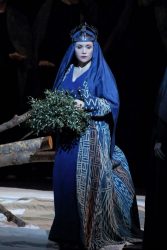 Germany Munich Opera Festival [1] – Bellini, Norma: Soloists, Chorus of the Bayerische Staatsoper, Bayerisches Staatsorchester / Andrea Battistoni (conductor), Nationaltheater, Munich, 30.6.2019. (JMI)
Germany Munich Opera Festival [1] – Bellini, Norma: Soloists, Chorus of the Bayerische Staatsoper, Bayerisches Staatsorchester / Andrea Battistoni (conductor), Nationaltheater, Munich, 30.6.2019. (JMI)

Production:
Director, Sets and Costumes – Jűrgen Rose
Lighting – Michael Bauer
Cast:
Norma – Carmen Giannattasio
Pollione – Riccardo Massi
Adalgisa – Angela Brower
Oroveso – Mika Kares
Flavio – Freddie de Tommaso
Clotilde – Selene Zanetti
I generally find the Munich Opera Festival to be the most satisfying of these summer events. Others may have more glamour, but none exhibit more quality or variety. This year, my stay in the Bavarian capital began with Norma, to be followed by La traviata that features Plácido Domingo as Germont père. It will finish with Kirill Petrenko conducting a new production of Salome.
The Jűrgen Rose staging had its premiere here in January 2006; it was one of the final productions commissioned by Peter Jonas, then the director of the theater. The premiere featured Edita Gruberová, accompanied by two singers who were at their peak: Sonia Ganassi and Roberto Scandiuzzi. The conductor was Friedrich Haider, whose presence on the podium requires no further explanation.
Rose has moved the action to more or less current times and located it in what appears to be the Middle East. I say it appears to be because the female chorus members wear Muslim-style clothes, while the supposed warriors could be from anywhere. Interestingly, in Act I and despite the current times, they use spears; in Act II they have got machine guns. The sets as well as the costumes are by Rose, and there are two stages throughout the performance: a sort of forest for the outdoor scenes and Norma’s house, reached by a staircase. It is a very dark production, and the lighting helps. The stage direction is routine, and draws attention (not always for the good) to the almost permanent presence in Norma’s house of her children.
Just last month, I had seen Andrea Battistoni leading Tosca in the Munich pit; I was not convinced by his performance then, and something similar happened on this occasion. His reading was characterized by an excess of decibels (particularly in the overture) and accelerated tempos, although he moderated these somewhat from the latter part of the first act. Both the Bayerische Staatsorchester and Bayerische Staatsoper Chorus did nicely.
Sonya Yoncheva had been announced to sing the role of Norma, but she canceled a few days ago due to her pregnancy. Her replacement was Carmen Giannattasio, whose voice is well suited to the part, in terms both of amplitude and tessitura; she solved nicely the agility passages. Her biggest problem – and it is not a minor issue – is that she sings everything in forte. I have rarely attended a Norma in which the protagonist is unable to make a sound piano, much less pianissimo. This has nothing to do with the memories one holds of Caballé or Gruberová in the past or Radvanovsky today, but the audience did not seem to mind.
Pollione was played by Italian tenor Riccardo Massi, who offered a rather routine performance, singing all his score between forte and fortíssimo with little nuance. His voice is that of a spinto tenor and shows no problems in the high notes.
The best singing came from mezzo-soprano Angela Brower. Her voice is attractive and she sings with gusto, although her very top is a little out of control. She was especially good in her first recitative.
Oroveso was played by bass Mika Kares, who has a sonorous voice. In the secondary characters, the Clotilde of Italian soprano Selene Zanetti made a very positive impression, and Freddie de Tommaso also did well in the role of Flavio.
The theater was almost sold out. The audience gave an enthusiastic ovation to the artists, especially Carmen Giannattasio and Angela Brower.
José M. Irurzun
